Judith Gap High School serves 6 students in grades 9-12.
The student:teacher ratio of 3:1 is lower than the Montana state level of 12:1.
Minority enrollment is 34% of the student body (majority Black and Hispanic), which is higher than the Montana state average of 23% (majority American Indian).
Quick Stats (2025)
- Grades: 9-12
- Enrollment: 6 students
- Student:Teacher Ratio: 3:1
- Minority Enrollment: 34%
- Source: National Center for Education Statistics (NCES), MT Dept. of Education
Top Rankings
Judith Gap High School ranks among the top 20% of public schools in Montana for:
Category
Attribute
Diversity
Percent Eligible For Free Lunch
Community Size
Student Attention
School Overview
Judith Gap High School's student population of 6 students has stayed relatively flat over five school years.
The teacher population of 2 teachers has stayed relatively flat over five school years.
Grades Offered
Grades 9-12
(offers virtual instruction)
(offers virtual instruction)
Total Students
6 students
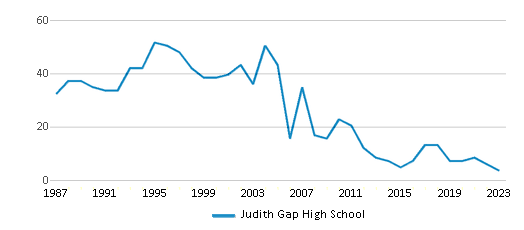
Gender %
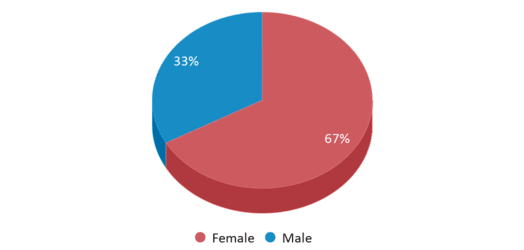
Total Classroom Teachers
2 teachers
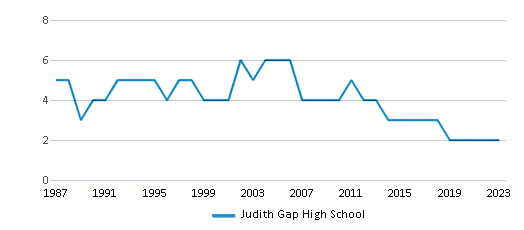
Students by Grade
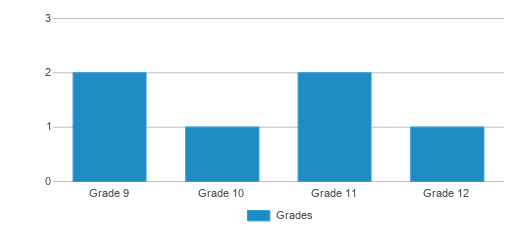
School Rankings
The diversity score of Judith Gap High School is 0.51, which is more than the diversity score at state average of 0.40. The school's diversity has stayed relatively flat over five school years.
Student : Teacher Ratio
3:1
12:1
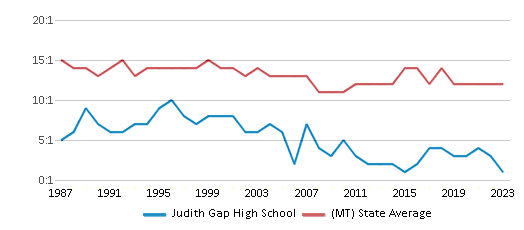
American Indian
n/a
10%
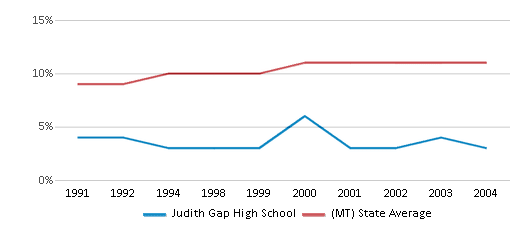
Asian
n/a
1%
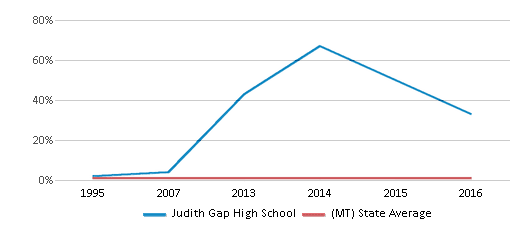
Hispanic
n/a
6%
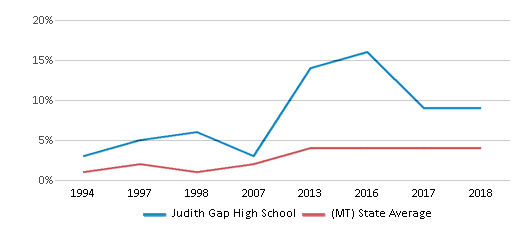
Black
n/a
1%
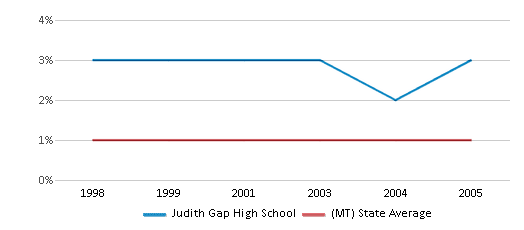
White
66%
77%
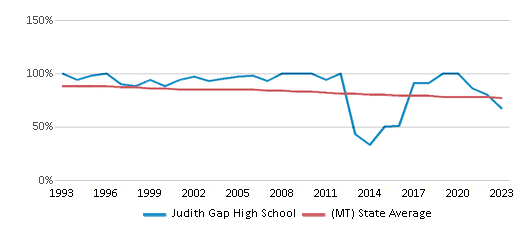
Hawaiian
17%
n/a
Two or more races
17%
5%
All Ethnic Groups
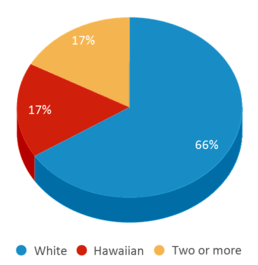
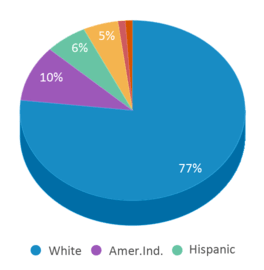
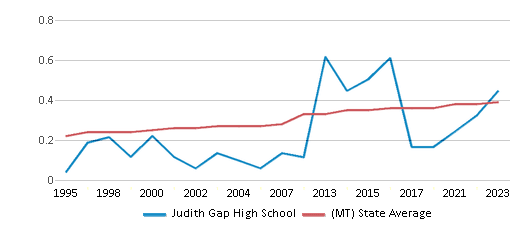
Participates in the National School Lunch Program (NSLP)
Yes
Eligible for Free Lunch
83%
42%
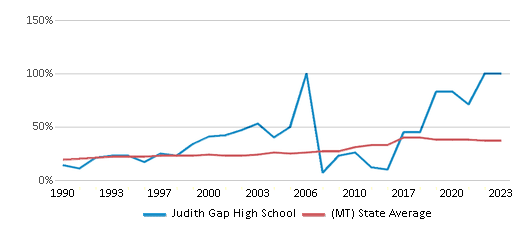
Eligible for Reduced Lunch (13-14)
50%
7%
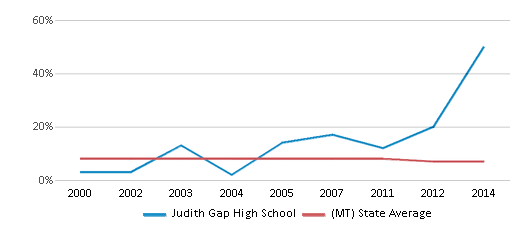
School Statewide Testing
School District Name
Sports
Total Sports Offered
9 sports
Sports
Basketball, Cheering, Cross Country, Cross Country Running, Football, Golf, Track, Track and Field, Volley Ball
Source: National Center for Education Statistics (NCES), MT Dept. of Education
Profile last updated: 02/09/2025
Frequently Asked Questions
How many students attend Judith Gap High School?
6 students attend Judith Gap High School.
What is the racial composition of the student body?
66% of Judith Gap High School students are White, 17% of students are Hawaiian, and 17% of students are Two or more races.
What is the student:teacher ratio of Judith Gap High School?
Judith Gap High School has a student ration of 3:1, which is lower than the Montana state average of 12:1.
What grades does Judith Gap High School offer ?
Judith Gap High School offers enrollment in grades 9-12 (offers virtual instruction).
What school district is Judith Gap High School part of?
Judith Gap High School is part of Judith Gap High School District.
School Reviews
1 7/2/2020
Superintendent does not try to talk to students. My 2 kids have friends over all the time, and no one cares for his unkindness. Very unfriendly to some parents as well.
1 4/17/2020
Person to person communication is BAD. Superintendents not close and not family oriented. Just all business, and codes, articles, and paragraphs.
5 7/19/2016
Judith Gap High School has 6 highly qualified teachers that teach grades 6 through 12. Because the teachers time is split between the high school and middle school, "on paper" we have 3. Technology is fully implemented throughout the district. All the students in high school have a laptop. In addition to the standard subjects (English, math, science, and social studies), we offer an array of electives including music and vo-ag. High school students are encourage to dual enroll with college and take AP classes. Teaching is individualized to the student.
Review Judith Gap High School. Reviews should be a few sentences in length. Please include any comments on:
- Quality of academic programs, teachers, and facilities
- Availability of music, art, sports and other extracurricular activities
Recent Articles

Sexual Harassment at Age 6: The Tale of a First Grade Suspension
A six-year old in Aurora, Colorado, was suspended after singing an LMFAO song to a little girl in his class and reportedly “shaking his booty.” We look at the case and the sexual harassment problem in public schools today.

How Scaffolding Could Change the Way Your Child Learns
This article explores the concept of instructional scaffolding, a teaching method that enhances learning by breaking down complex tasks into manageable parts. It highlights how scaffolding supports students in developing critical thinking skills and becoming more independent learners. The article discusses the benefits of scaffolding, including improved engagement and reduced anxiety, and provides strategies for its implementation across various educational levels.

February 05, 2025
Understanding the U.S. Department of Education: Structure, Impact, and EvolutionWe explore how the Department of Education shapes American education, from its cabinet-level leadership to its impact on millions of students, written for general audiences seeking clarity on this vital institution.





